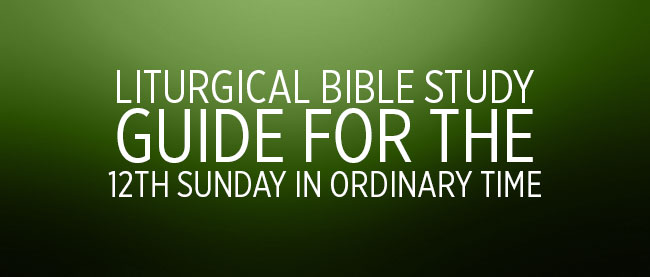1st Reading – Zechariah 12:10-11
The Book of Zechariah (Zechariah means “Yahweh remembers”) comes chronologically after that of Haggai. The prophet Zechariah belonged to a priestly family which had returned from the Babylonian exile. Like Haggai, he was called by God in 520 B.C. He probably lived until very near the time the new Temple was finished.
When the Jews returned to Jerusalem after being released by Cyrus the Great, king of Persia, an altar was immediately erected on the ruins of the Temple of Solomon and sacrifices were offered to Yahweh. Then the building of a new Temple was begun. But after the foundations had been laid, the work was interrupted and finally stopped by the interference of the Samaritans. Haggai had given the first impulse to the building of the temple, Zechariah saw to it that the people and their leaders did not lose courage as the work slowly progressed and the opposition of the Samaritans increased. Like Haggai, Zechariah saw in the completion of the Temple the prelude to the new and glorious age of the Messiah.
Again and again in the course of his prophecy Zechariah seeks to revive the chosen people’s faith in their glorious destiny by picturing the doom of their oppressions and the great peace of the Messianic Kingdom.
2nd Reading – Galatians 3:26-29
At the beginning of his 3rd missionary journey, around the year A.D. 53, Saint Paul passed through Galatia to visit the Christian communities he had established in the area (Acts 13:14ff), which he had also visited during his 2nd journey (Acts 16:1-5). The communities in question were in the southern part of Galatia: Pisidia, Antioch, Konium, Derbe, and Lystra. The Galatians had responded very well to Paul’s apostolate and the churches were flourishing.
However, on this last journey, Saint Paul was very surprised to find that the Galatian Christians (most of whom came from a Gentile background) had been led astray by “false brethren” (Judaizers), who made out that Christians should conform to the Mosaic law and, therefore, should be circumcised. Perhaps because he was short of time, the Apostle was unable to go into the matter in detail; at any rate, when he reached Ephesus (A.D. 53-54) he wrote the Galatians a letter refuting the errors involved, in which he goes into the whole question of the relationship between the Gospel and Mosaic law, between the Old Covenant and the New. He tries to get them to see that the key point is this: Accepting Mosaic doctrine would mean in practice renouncing the justification won for us by Christ – and therefore denying the value of the redemption; it would imply renouncing freedom, because they would be submitting to the voice of the Law, which is slavery; it would mean rejecting the grace and salvation which faith in Jesus the Christ brings with it. The universality of the Church would be destroyed and Christ’s doctrine irreparably damaged.
The Judaizers, for their part, were arguing that God Himself had instituted the Law of Moses, which Christ had come not “to abolish but to fulfill” (Matthew 5:17). They even went as far as to invoke the authority of the twelve against Paul, ignoring the decisions of the Council of Jerusalem which had gone into this whole question and with whose teaching Saint Paul was in line (Acts 15:28-29).
Gospel – Luke 9:18-24
Luke uses Chapter nine of his gospel to segue (transition) from Jesus’ Galilean ministry to His journey to Jerusalem. The themes of Jesus’ Galilean ministry where He preached about the fulfillment of God’s promise, restored men and women to health, and cast out demons, are now focused through the cross.


